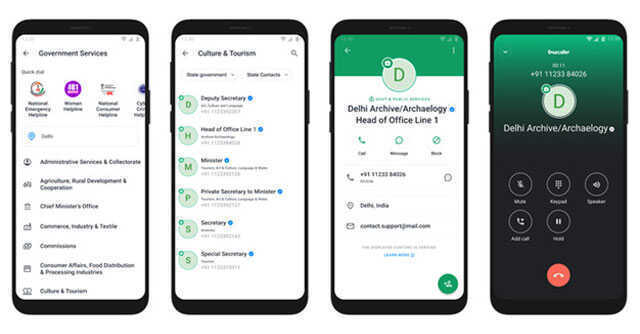
Truecaller adds government database, amid TRAI threat


Even as an upcoming government driven caller-id system threatens its business in India, Swedish caller identification service, Truecaller, added a database of government services to both its Android and iOS platforms on Tuesday. This includes public helplines of official state and central government services, embassies, government-backed police departments, schools and hospitals, and more. The service is presently available across 23 states and union territories.
The announcement comes one week after the Telecom Regulatory Authority of India (Trai) released a cross-industry consultation paper to build a native caller name identification system. On November 29, in its consultation paper titled ‘Introduction of Calling Name Presentation (CNAP) in Telecommunication Networks’, Trai noted that the presently available caller identification options for users — which includes Truecaller itself — are not entirely reliable since their services are “based on crowd-sourced data, which may not be reliable in many instances.”
Trai’s efforts to help build an ‘official’ caller identification system would directly impact the core business model of Truecaller, which is among the most popular caller identification services. The company claims it has over 240 million users in India — its largest market.

Industry experts said that while Truecaller’s primary product so far remains caller identification, the move to add a government directory could be the early steps of the company looking to diversify its services. Nishant Bansal, senior research manager for telecommunications, Asia-Pacific at market analysis firm International Data Corporation (IDC) said that Truecaller is likely to make more such announcements “to protect its largest market by user base, as India accounts for nearly 75% of all its users around the world.”
“The government’s CNAP database is presently under consultation, and telcos and involved parties are likely to take at least 12 months — and most likely more than that — to come to a consensus for India to have an ‘official’ caller identification service. This gives Truecaller time to diversify its offerings with other value added services, such as the ‘smart SMS’ service that it launched last year to identify spam links and scams in a phone’s SMS inbox,” Bansal said.
He further said that new features such as these could be key to Truecaller succeeding in diversifying beyond just caller identification. “If you see on Android devices, there is already a default indicator built into the system that alerts users about potential spammers. This makes it important for Truecaller to diversify its services effectively. For instance, the government directories may not find a lot of takers if they only offer the central government’s broad department numbers — a more localized view of numbers with state government and local authority bodies may help the service find takers in the long run.”

At present, Truecaller offers two paid tiers of service for its users — Premium Connect at ₹549 per year, and Premium Gold at ₹4,999 per year. The company advertises features such as ad-free usage, ’premium’ spam protection, ‘who viewed my profile’ and an incognito mode to protect a user’s own identity.
The government directory, however, will not be a paid service. Truecaller also rolled out features like covid-19 helplines in April last year, and ‘Smart SMS’ spam filtering service in June last year.
